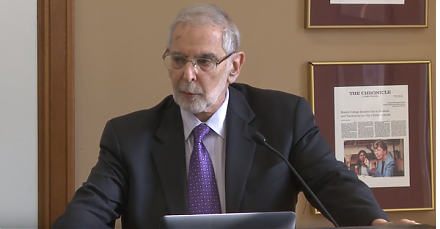

2019-04-23 19:45:00 Tue ET
technology antitrust competition bilateral trade free trade fair trade trade agreement trade surplus trade deficit multilateralism neoliberalism world trade organization regulation public utility current account compliance
Income and wealth concentration follows the ebbs and flows of the business cycle in America. Economic inequality not only grows among people, but it also grows among companies. A recent McKinsey study shows that only 10% of 5,750 public and private companies (each with over $1 billion in total revenue) account for 80% of their net profits. These top 10% superstar companies can create almost as much firm value as the bottom 10% companies destroy on an annual basis. The top 10% superstar wealth creation has grown 1.6 times in the past 20 years, whereas, the bottom 10% value erosion has risen only 1.5% in the same time frame. One major root cause of this wealth divergence is the corporate focus on key intangible assets and intellectual properties such as patents, trademarks, databases, robots, cloud services, and software solutions. These intangible assets thus serve as affordable competitive moats for the top 10% superstar companies. These top 10% superstar firms spend about 2 to 3 times more on R&D than their peers and hence account for 70% of all R&D expenditures in Corporate America as of early-2019.
However, the top 10% superstar companies are less likely to maintain their product market dominance because half of the superstar companies lose their competitive advantages over the course of one single real business cycle (or about 7-9 years). For this reason, tougher antitrust scrutiny may not be the panacea for addressing the economic implications of anti-competitive clout in tech titans (Apple, Amazon, Alibaba, Facebook, Google, Microsoft, Nvidia, and Twitter), big biotech bellwethers (Johnson & Johnson, Pfizer, Merck, Abbot, Amgen, and Bristol-Myers Squibb etc), and telecoms (Verizon, AT&T, Sprint, and T-Mobile etc). Weaker product market competition may help explain why U.S. productivity growth, capital investment, and wage growth continue to stagnate in recent years.
This dilemma often manifests in the 7%-8% increase in average markups over the marginal costs for more than 900,000 firms from 2000 to early-2019 in accordance with a recent IMF staff report. The higher markups significantly correlate with lower capital investment, subpar wage growth, and less disposable income for the typical U.S. household. In other words, these markups represent the inadvertent social price of market power. Overall, it is important for regulators to help promote greater market competition in several industries such as technology, energy, medicine, air transport, and telecommunication etc.
If any of our AYA Analytica financial health memos (FHM), blog posts, ebooks, newsletters, and notifications etc, or any other form of online content curation, involves potential copyright concerns, please feel free to contact us at service@ayafintech.network so that we can remove relevant content in response to any such request within a reasonable time frame.
2019-02-28 20:44:00 Thursday ET

AYA Analytica finbuzz podcast channel on YouTube February 2019 In this podcast, we discuss several topical issues as of February 2019: (1) our proprieta
2017-01-11 11:38:00 Wednesday ET

Thomas Piketty's recent new book *Capital in the Twenty-First Century* frames income and wealth inequality now as a global economic phenomenon. When
2019-12-30 11:28:00 Monday ET

AYA Analytica finbuzz podcast channel on YouTube December 2019 In this podcast, we discuss several topical issues as of December 2019: (1) The Trump adm
2019-08-28 14:46:00 Wednesday ET

Santa-Barbara political economy professor Benjamin Cohen proposes new fiscal stimulus to complement the current low-interest-rate monetary policy. Cohen fin
2019-05-09 10:28:00 Thursday ET

President Trump ramps up 25% tariffs on $200 billion Chinese imports soon after China backtracks on the Sino-American trade agreement. U.S. trade envoy Robe
2019-06-21 13:33:00 Friday ET

Amazon and Google face more intense antitrust scrutiny. In recent times, Justice Department and Federal Trade Commission have reached an internal agreement